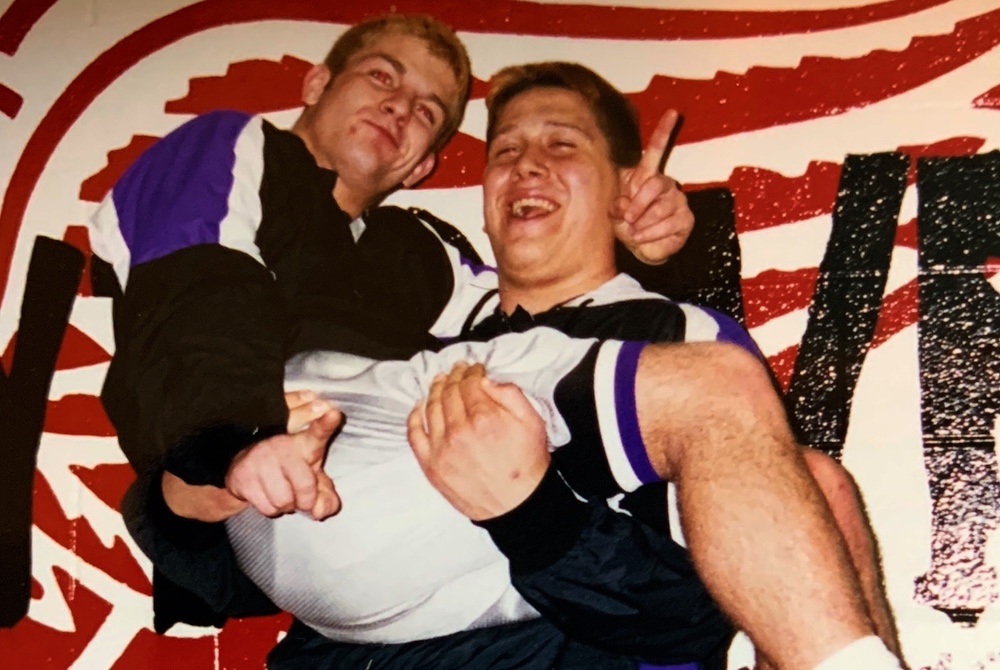
Caro Champs Find Common Ground Again as Mental Health Providers
By
Paul Costanzo
Special for MHSAA.com
July 8, 2021
Phil Millerov and Phil Niklowicz wanted to do more than simply defeat opponents when wrestling at Caro High School.
They wanted to dominate – physically and mentally.
 “We had this thing between us where we wanted to be done, and (opponents) didn’t want to come back on the mat with us,” Millerov said.
“We had this thing between us where we wanted to be done, and (opponents) didn’t want to come back on the mat with us,” Millerov said.
Twenty years later, both spend their days building people up. Millerov is a licensed professional counselor, while Niklowicz is a licensed therapist.
“I went out there looking to dominate and make sure it was known that I am the superior wrestler in all facets,” Niklowicz said. “I would try to run up as many points as fast as I can. I would teach the same thing when coaching, specifically with my nephew. You’re saying, ‘Listen, we want to break these people.’ Then the next day, in a therapy session, it’s like, ‘Let’s build up your self-esteem and set some goals to boost ourselves up.’”
The close friends and two faces of Caro’s surging wrestling program in the late 1990s now have very similar careers. Millerov – who finished second, third and first at 275 pounds in the 1998, 1999 and 2000 MHSAA Finals, respectively -- works in private practice at Transitions Counseling Service in Greenville, where he specializes in substance abuse disorders. He also has served as a Class 1 Fellow at the WK Kellogg Foundation.
Niklowicz – a two-time MHSAA Finals champion (1999 and 2000) and four-time placer – is working in private practice in Southfield, seeing mostly children. He also works in adult foster care with patients who have had traumatic brain injuries.
“He and I went and hiked Pictured Rocks at the beginning of May,” Millerov said. “And we joked about how nobody would have guessed that we’d be doing this now.”
That Millerov and Niklowicz are still close does not come as a surprise. Their friendship began when their wrestling careers did, as 6-year-olds in the Caro Growlers program. As they were becoming two of the state’s top wrestlers, they would share rides to tournaments, and their families grew close.
In high school, despite their size difference – Niklowicz wrestled at 135 his senior year – it wasn’t uncommon to see them warming up together.
“We were definitely easy going and liked to mess around a lot,” Niklowicz said. “We used to mess around before meets and throw each other. He would jump and I would throw him. People would look at us like, ‘Why is that little guy throwing that big guy?’”
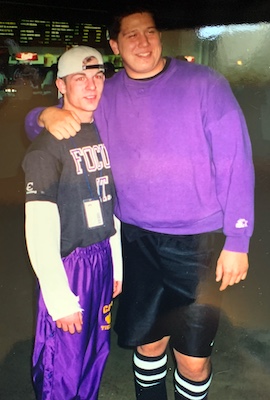 While their teams never made it out of the Regional, Millerov and Niklowicz helped set the stage for a program that would become among the best in Division 3 throughout the 2000s, qualifying for five straight Quarterfinals from 2003-07 and winning the Division 3 Finals title in 2003.
While their teams never made it out of the Regional, Millerov and Niklowicz helped set the stage for a program that would become among the best in Division 3 throughout the 2000s, qualifying for five straight Quarterfinals from 2003-07 and winning the Division 3 Finals title in 2003.
Individually, they were among the most well-known and feared wrestlers in the state.
“Niklowicz and I were fortunate to have each other, because we pushed each other,” Millerov said. “We were in constant competition with each other and ourselves. Just to kind of push each other, it was a great thing.”
Niklowicz finished fifth as a freshman and third as a sophomore before winning back-to-back titles to close out his career. In 1999, he defeated Nick Oertel of Goodrich 9-2 in the 125-pound final, and the next year he defeated Oertel’s teammate, Ryan Tripp, 7-5 at 135. Tripp would go on to win an individual title the following year. Niklowicz would finish his career with 214 victories.
“I think probably both (Finals titles) were equal,” Niklowicz said. “I think there was probably a little more stress going into my senior year. My motivation always came from improving, then it was maintaining the state title. You don’t want to go the opposite direction.”
Millerov lost a tight 6-4 decision against Remus Chippewa Hills’ Bob Kozlowski in the MHSAA Finals as a sophomore, and had an epic 12-10 match against future NFL defensive lineman Jason Babin of Paw Paw in the 1999 semifinals before fighting back to take third. The next year, he won his title via first-period pin against Dan Kliphuis, a two-time runner-up from Grand Rapids West Catholic. Millerov finished with 196 career wins and set the state record for pins in a career (160), which was broken the next season by Nick Simmons of Williamston and is now held by Justin Zeerip of Hesperia. The 56 pins Millerov recorded his senior season remains second all-time to Simmons, who had two seasons with 57.
“I never really thought about (the pin record) to be quite honest,” Millerov said. “It was just kind of in the background. It didn’t matter; all I cared about was winning this match, and I wanted to do it in the most effective, efficient way I could.”
They both continued their wrestling careers, but went their separate ways in college, with Millerov heading to Neosho County Community College in Kansas and Niklowicz to Virginia Tech.
Millerov had interest from several Division I schools coming out of high school, including some in the Big Ten, but he admits his grades weren’t good enough at the time. Neosho provided a chance to compete with some of the best in the country while at the junior college level, however, as the team took second at the National Junior College Athletic Association championships in 2002.
He transferred to Central Michigan after his sophomore year, joining his girlfriend – now his wife – who was already attending, and walking onto the wrestling team. While his relationship lasted, wrestling did not.
“I was distracted,” Millerov said. “My grandmother passed away in 2002 in that summer. I was trying to get that motivation back, and I just lost it. There has to be that edge with wrestling. When things didn’t work out, I struggled. Wrestling was my identity.”
Millerov was working to follow in his father’s footsteps and become a police officer. But the elder Phil Millerov, who died in 2012, talked his son out of it.
“Looking back on it, for me, it was obviously the right decision,” Millerov said.
The idea to go into counseling came after Millerov was married in 2006, as his wife had gotten into the program. He went back to school to earn his bachelor’s degree from CMU in 2007, and would go on to get his master’s from CMU, as well.
“I had taken a bunch of psychology courses just because I liked the field,” Millerov said. “I liked to be challenged. I liked puzzles, and with psychology, it’s like a new puzzle every hour. It just clicked. I flew through and graduated with like a 3.8. I was like, ‘Wow, I kind of feel smart.’ It was good to find something I was passionate about again.”
Millerov said he’s constantly learning and honing his craft, much like he did as a wrestler. A major difference now, however, is that he’s found more balance in his life.
“I think about working with athletes in addiction, I find a lot of similarities,” he said. “Wrestling was my life, it’s how I identified myself. I hear that same kind of talk around people struggling with addiction. One you’re considered successful for, the other you’re not. Most of my growth has been around finding balance. I find that my happiness and my clients’ as well, is when we found that balance instead of being good at just one thing. I want you to have passion, I want you to do things you love, but I also want you to be effective as a husband, a father, whatever other responsibilities you have.”
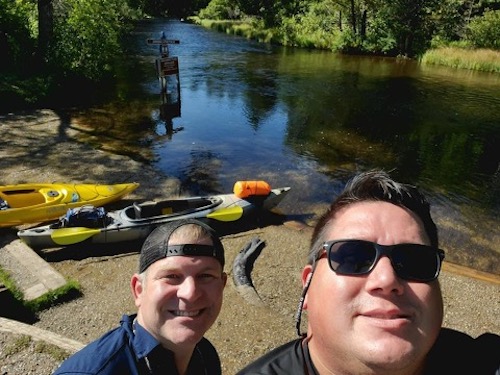 Niklowicz’s journey to becoming a therapist was more telegraphed, as both of his parents work in mental health, and he said it was always something he wanted to do, as well.
Niklowicz’s journey to becoming a therapist was more telegraphed, as both of his parents work in mental health, and he said it was always something he wanted to do, as well.
He attended Virginia Tech on a wrestling scholarship, but transferred to Eastern Michigan after one year. The Hokies had recruited him to wrestle at 133 pounds, but when the team’s 125-pounder was injured, Niklowicz was asked to cut down further. Like Millerov, he struggled when his wrestling career ended.
“I just had a really bad taste in my mouth after leaving Virginia Tech and trying to cut all this weight,” he said. “Some of it was I had lost the desire to work out, to wrestle. Fifteen years, roughly, of my life was dedicated to wrestling, and once you stop, what do I do with my winters? What do I do with seven months of the year? It was definitely a part of my identity; that’s why I got into coaching. I did MMA fighting for a little bit to have something competitive.”
Like Millerov, Niklowicz said finding balance was important.
“In the mental health field, specifically, there’s a lot of burnout for people,” he said. “Every day, you’re listening to people talking about their problems, but at the same time, they’re coming for a reason and they’re there for help, so you have to provide that help and have to motivate yourself to come to the office every day and give it your best. I try to instill the motivation that I used to other people.”
When Niklowicz looks at his time as an athlete compared to his work as a therapist, he said that work ethic is the main characteristic that has carried over.
“I think my practice mentality was the same as it was on the mat,” he said. “Even in the wrestling room, these are people I’m friends with, people I grew up with, and I still didn’t want anyone to score on me. Then you just look at your work ethic outside of wrestling, whether you’re studying for exams or motivating yourself to get up and go to class.”
While they are no longer living in the same town or living similar lives – Millerov is married with three kids, while Niklowicz is single – the connection between Caro’s dominant duo remains strong, both professionally and personally.
“I don’t think we ever thought we would be going down such a similar path, and I doubt that either one of us grew up thinking we would do the exact same thing,” Niklowicz said. “We met when we were 6 years old, and we’ve been best friends forever. I think it’s hilarious that we’ve taken such similar paths but with some glaring differences. It’s definitely interesting that we’re still really good friends after 30-some years, especially since we’ve moved on and gone our separate ways.”
2020-21 Made in Michigan
June 28: Michigan's Minor Leaguers Making Up for Lost Season - Read
PHOTOS: (Top) Caro’s Phil Millerov lifts teammate Phil Niklowicz as both celebrate Division 3 championships during the 2000 Individual Finals at Joe Louis Arena. (Middle) Niklowicz, left, and Millerov were high school warm-up partners despite wrestling at significantly different weights. (Below) Niklowicz and Millerov take a selfie during a hiking trip to Pictured Rocks National Lakeshore in May. (Photos courtesy of Niklowicz and Millerov.)
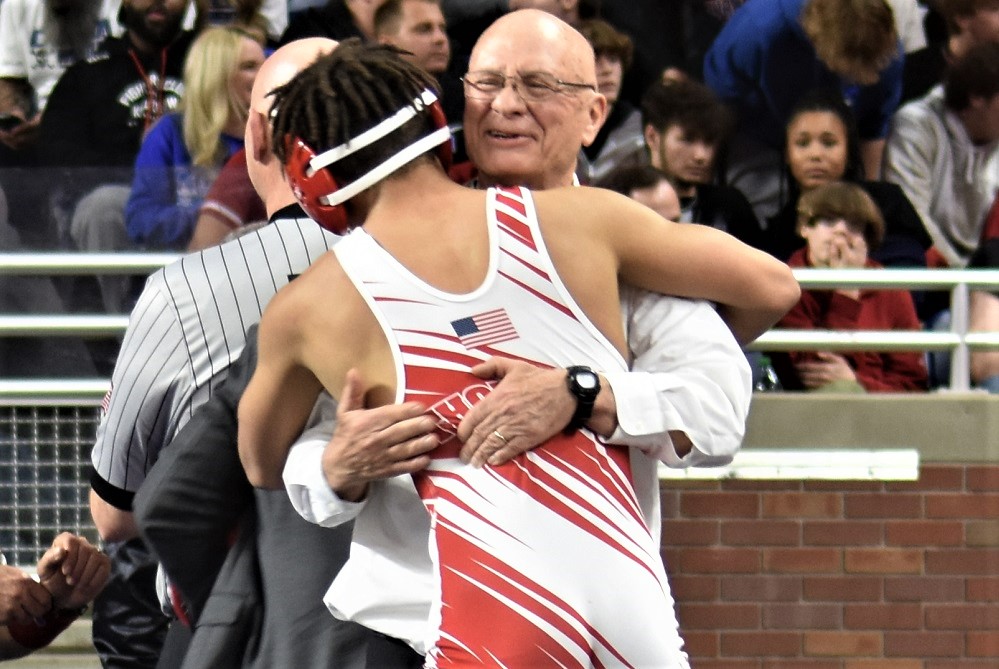
Winningest Coach Moving on from Matside, but Leaving Lasting Lakeshore Impact
By
Wes Morgan
Special for MHSAA.com
April 11, 2022
Bruce Bittenbender’s impact on the sport of wrestling in Michigan is immeasurable.
 And the fact that he’ll no longer occupy a chair next to the mats at Stevensville Lakeshore High School is almost unfathomable after a legendary 52-year career there.
And the fact that he’ll no longer occupy a chair next to the mats at Stevensville Lakeshore High School is almost unfathomable after a legendary 52-year career there.
His list of accomplishments over that span is staggering, though the incalculable number of lives he touched — a realization that came from the outpouring of messages from his former student-athletes following his retirement announcement in late March — is what Bittenbender believes is the most important part of his legacy.
“It is absolutely heartwarming,” Bittenbender said at his retirement press conference April 1. “In many cases (some students) are on the edge. I had a guy say to me yesterday, ‘Coach, I didn’t have a father. I want to thank you.’
“How many state titles is that worth? There is a lot of that I appreciate.”
What can be quantified are the competition results during his tenure.
Bittenbender leaves with a dual meet record of 981-270-2 — the most victories in state history and the second most in the country. The program claimed 28 District titles, 13 Regional championships and 33 conference titles. The Lancers were undefeated in duals four times (1976, 1978, 1984 and 1986) and finished as MHSAA Finals runners-up twice (1986 and 1994).
“There are no shortcuts to being successful,” Lakeshore athletic director Greg Younger said. “Coach is always here. He’s probably here more than most teachers (although he retired in 2010). He is in the building early and often. He’s scrubbing the mats. I know it doesn’t magically happen. He’s always here preparing for a match and doing something here, talking to kids in the halls and building those relationships.
“He’s been a testament to hard work and what it takes to really have a goal all the time. When he steps into the wrestling room he’s always prepared, he’s always planning for tomorrow and he’s always planned for what’s coming up next. Nothing has ever surprised him.”
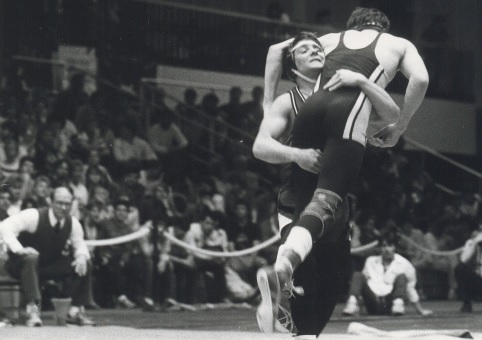 There were a total of 26 Individual Finals champions and 116 state placers under his watch, with Micah Hanau (also a winner in 2020), Zamuel Thompson and Aaron Lucio the most recent to have stood atop the podium and celebrate championships with Bittenbender last month at Ford Field.
There were a total of 26 Individual Finals champions and 116 state placers under his watch, with Micah Hanau (also a winner in 2020), Zamuel Thompson and Aaron Lucio the most recent to have stood atop the podium and celebrate championships with Bittenbender last month at Ford Field.
Shane Williams (2020), Riley Bettich (2018), Tyler Humes (2010), Tyler Daniel (2009), Ryan Huebner (2002), John King (1992), Scott Mabrey (1992), Mark McKie (1992, 1991), Jason Cluff (1988, 1987, 1986), Dave Strejc (1988), Matt Cluff (1987, 1986, 1985), John Spear (1986), Gary Smith (1981, 1980) John Murphy (1979), Doug Smith (1978), and Rick McGrath (1974) all were guided to the state’s top individual level by Bittenbender.
For his accomplishments, Bittenbender was named Regional Coach of the Year 11 times, Michigan Wrestling Coach of the Year by the Coaches Association (2002) and National Coach of the Year twice, by the National Federation of State High School Associations (2002) and National High School Athletic Coaches Association (2010). His rightful spot in the Michigan Wrestling Coaches Association Hall of Fame was claimed in 2010, and he was inducted into the National Coaches Association Hall of Fame the following year. In 2012, his home state honored Bittenbender with an induction into the Pennsylvania Wrestling Hall of Fame, and Milligan University (Tenn.), where he wrestled four years, did the same in 2019.
“We went through three years of pulling teeth and hard work,” said Bittenbender, who took over at struggling Lakeshore in 1970. “Finally, we hit pay dirt. We got a kid to be state champion (in 1974), Ricky McGrath. This guy opened it up. After that, kids wanted to be Lakeshore wrestlers.”
But there were thousands of others that also laid bricks over the years to help build the program up to where it is today.
“There were a lot of kids that weren’t state champions here; there were a lot of kids that weren’t District champions or Regional champions or even conference champions,” Bittenbender said. “But they were here everyday, they were working everyday, they were part of this program and you’ve got to give those kids credit.”
Ryan Quinn takes over the program after serving as assistant coach.
“I’m incredibly blessed, grateful and humbled to be part of this school, to be taking over the reins of such a successful wrestling program,” Quinn said. “It is truly an honor to succeed Coach Bittenbender. He has made such a lasting impression on my life in such a short period of time. I know with confidence he has made lasting impacts on all who are involved in his as well. His fingerprints will forever remain on this school district and wrestling program.”
Bittenbender thanked his family, all the parents, volunteers and sponsors that supported the program over the last 52 years.
“It was a great place to live; it was a great place to coach. I’m lucky. It is a great community, my kids got a great education here, and it has been great to see kids go on to be good fathers and go to work every day,” he said.
“I want to thank my family over the years. If you’re going to be a wrestling coach’s wife, you’ve got to be something special. We’re going to spend a lot more time together.”
When Bittenbender was named 2010 National Coach of the Year, Nebraska’s Tom Osborne was the keynote speaker. Bittenbender recalled him saying: ‘If you want to know if you’re a good man, write down the 10 things you want the guy to say in your obituary. If he says eight of them, you’re a good man.”
“I hope I’m a good man,” Bittenbender said.
 Wes Morgan has reported for the Kalamazoo Gazette, ESPN and ESPNChicago.com, 247Sports and Blue & Gold Illustrated over the last 12 years and is the publisher of JoeInsider.com. He can be reached at [email protected] with story ideas for Berrien, Cass, St. Joseph and Branch counties.
Wes Morgan has reported for the Kalamazoo Gazette, ESPN and ESPNChicago.com, 247Sports and Blue & Gold Illustrated over the last 12 years and is the publisher of JoeInsider.com. He can be reached at [email protected] with story ideas for Berrien, Cass, St. Joseph and Branch counties.
PHOTOS (Top) Retiring Stevensville Lakeshore wrestling coach Bruce Bittenbender, right, embraces Zamuel Thompson after Thompson’s Individual Finals championship win last month at Ford Field. (Middle) Lakeshore’s Matt Cluff lifts Eaton Rapids’ Scott Bolin during their 1986 Class B championship match. (Top photo by HighSchoolSportsScene.com, middle photo courtesy of the St. Joseph Herald-Palladium.)

